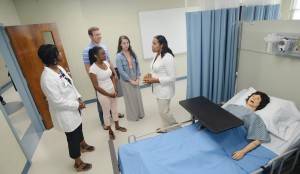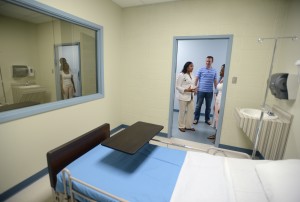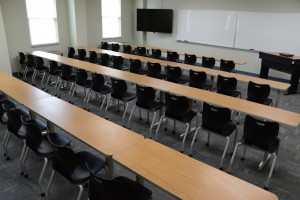Marquis Browdy, a senior communications major who is interning with Belhaven’s Communications Department, wrote this Inside Belhaven blog entry after interviewing three of our international students.
“To serve, not to be served” from Matthew 20:28 is Belhaven University’s motto and Belhaven continues to be an institution that accommodates all people, denominations, and cultures. The University’s enrollment in Jackson includes 84 international students, up from 51 students a year ago. Students from 28 countries are studying on the Jackson campus with the largest groups from Brazil, South Korea, Columbia, United Kingdom, Africa, and France. International students attend Belhaven for many reasons, which range from degrees, sports, and the arts to the Christ-centered education and worldview curriculum.
Belhaven University recruits through sports, countrywide student exchange programs, an increasing web presence and even broadcasting. For instance, many of our South Korean students heard of Belhaven through the Far East Broadcasting Company (FEBC) where ads about Belhaven are played throughout South Korea. Other organizations such as the “Hendrix Consortium” allow African students from Rwanda to attend Belhaven through the Rwandan Presidential Scholarship program.
This blog entry focuses on the perspective of students and how they are adjusting to the U.S. customs and culture. In this interview I also discussed their adjustments to the U.S., the difference they have noticed between cultures and their plans after graduation.

Haeun Lee
She is a freshman and communications major from Seoul, South Korea.
How did you discover Belhaven University?
“We have a program for students called International Program Barom (IPB), where we can choose to go to any school in America. I chose Belhaven because I heard from a former students from Korea tell me it’s the best university and the students are really kind, and I think that they’re right.”
How has your adjustment been adapting to the U.S.?
“Actually I didn’t experience culture shock. I really like it here because there a lot of events that I can’t participate in Korea, like Homecoming, we don’t have that in Korea.”
How is Belhaven different from your school in South Korea?
“At Belhaven there is a lot of homework. We don’t have a lot of homework in Korea, it is just more hands-on in class. And we also don’t have events like homecoming or dances; also there are a lot of breaks here. We only have summer and winter break, along with “Chusuk”, it’s the Korean Thanksgiving.”
What has your experience been like at Belhaven?
“Since coming to Belhaven I’ve experienced my very first football game. I also love that Belhaven is a Christian university. I get to participate in RUF and I also get to help out in Chapel.”
How do you think you can benefit from attending Belhaven University in America?
“I want to be a producer, so I wanted to learn more in that field, I also wanted to meet new people. I want to experience a lot of new and different things that I couldn’t experience in Korea. In Korea there are only Koreans, but in the United States there are many people and many different cultures.”
What are you planning on doing after Belhaven?
“I have to go back to Korea and study one year to be a producer and I have to start my internship then my career.”

Daniel Duarte
He is a sophomore and a Mathematics/Pre-Engineering major from Bogota, Columbia.
How did you discover Belhaven University?
“I was contacted then recruited by the tennis coach Levi Patton to play here under scholarship.”
What is the most distinct difference between cultures from U.S. compared to Columbia?
“The food is the most different. In the U.S. people eat a lot of fast food and the rice and potatoes are very different. Also, all our juices are natural; here there are a lot of artificial juices.”
How has your adjustment been adapting to the U.S.?
“It’s been ok, all my friends from Latin America were here before I got started at Belhaven and they have helped me adjust to American culture.”
How has your experience been at Belhaven?
“I like it and the classes, tennis team, and the scholarship I’m getting here is good.”
Do you plan on going back to Columbia after you receive your degree from Belhaven or staying in the U.S.?
“I think I will go back to Columbia and work there.”

Jeanne Ishimwe
She is a freshman and Chemistry major from Kigali, Rwanda.
How did you hear about Belhaven University?
“I didn’t know about Belhaven before, but through a program called “Hendrix Consortium” (Hendrix College leads a consortium of 19 private and public institutions of higher education, hosting over 220 Rwandan students) I was selected to attend Belhaven University.”
How has your adjustment been adapting to the U.S.?
“It was kind of difficult for me because everything is totally different from back home. But the people are so friendly, so it was easier to get adjusted.”
What is the most distinct difference between cultures from U.S. compared to Rwanda?
“Everything is different because at home everybody is concerned with their own business. Here it’s friendlier. The culture, way of dress, and food, everything is just different.”
How have your teachers and peers at Belhaven made you feel at home?
“I feel in a way that I’m home because the school fits me more than I expected. The teachers are really different than back home, back home the teacher is like the king of the class. But here it’s like a brother teaching you, there’s a more personal relationship here where you can interact with your teacher. For example, you can’t say the name of the teacher in Rwanda; students would have to say professor or teacher.”
Are you homesick?
“Sometimes but not always. It all depends, when I feel bored or get some news from back home I start to miss my family, but now I’m not homesick.”
Do you plan on going back to Rwanda after you receive your degree from Belhaven or staying in the U.S.?
“I will pursue graduate school, but if I don’t get in I would probably go back home.”
Do you have a host family and how has that helped you transition to American culture?
“Yes, I have a host family, Jenny; she’s a member of the faculty at Belhaven. It’s really helpful because I got familiar with their culture, finding stuff in the kitchen, and also exposed to other cultures in America. It’s also helpful for internationals because we usually don’t have cars, so our host family helps us get around.”













